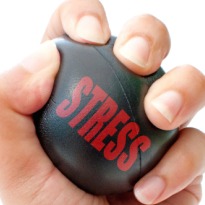
Many workers now feel as if they’re doing the job of three people. They are on call 24 hours a day. They rush their children from tests to tournaments to tutoring.
The stress is draining, both mentally and physically.
At least that is the standard story about stress. It turns out, though, that many of the common beliefs about stress don’t necessarily give the complete picture.
Misconception No. 1: Stress Is Usually Caused by Having Too Much Work
While being overworked can be overwhelming, research increasingly shows that being underworked can be just as challenging. In essence, boredom is stressful.
“We tend to think of stress in the original engineering way, that too much pressure or too much weight on a bridge causes it to collapse,” said Paul E. Spector, a professor of psychology at the University of South Florida. “It’s more complicated than that.”
Spector and others say too little to do – or underload, as he calls it – can cause many of the physical discomforts we associate with being overloaded, like muscle tension, stomachaches and headaches.
A study published this year in the journal Experimental Brain Research found that measurements of people’s heart rates, hormonal levels and other factors while watching a boring movie – men hanging laundry – showed greater signs of stress than those watching a sad movie.
“We tend to think of boredom as someone lazy, as a couch potato,” said James Danckert, a professor of neuroscience at the University of Waterloo in Ontario, Canada, and a co-author of the paper. “It’s actually when someone is motivated to engage with their environment and all attempts to do so fail. It’s aggressively dissatisfying.”
It’s not just the amount of work, Spector said, also but the type. The professor recalled that when he was younger, he worked in a contact lens factory, where the work was constant but tedious. He lasted only two months.
“You can be very busy and a have a lot to do and still be bored,” he said. The job – whether a white-collar managerial position or blue-collar assembly line role – also needs to be stimulating.
In a 2011 paper based on the doctoral dissertation of his student Kari Bruursema, Spector and his co-authors found that the stress of boredom can lead to counterproductive work behavior, like calling in sick, taking long breaks, spending time on the Internet for nonwork-related reasons, gossiping about colleagues, playing practical jokes or even stealing. While most workers engage in some of these activities at times, the bored employee does it far more frequently, he said.
Spector noted, though, that what might be dull to one person might suit another just fine. One of his colleagues at the contact lens factory, he said, was perfectly content.
“It drove me crazy, but he was very happy working eight hours a day at the same thing,” Spector said. “And he did it well.”
Misconception No. 2: Stress Is Always Bad
The classic idea of stress – too much to do, too challenging a task – is common. But even that kind of stress should be rethought.
The trouble, said Kelly McGonigal, a psychologist, is that stress is seen “as inherently toxic, and that can motivate people to avoid it rather than engage with life.”
Research has shown that if people learn to view stress with a different mindset – as helpful rather than disabling – then they can learn to better handle its effects.
Alia J. Crum, an assistant professor of psychology at Stanford University and her colleagues, performed an experiment with 350 employees of a company that was laying off 10 percent of its workforce.
One-third of the employees watched three videos that emphasized the positive aspects of stress. The videos focused on how hormones released under stress help the body cope, sharpen cognitive functioning and speed up the brain. As an example, one video shows basketball superstar LeBron James sinking a free throw under pressure.
The videos also talk about how even the most traumatic stress can help people grow by developing mental toughness, new perspectives and greater connections with others, “not in spite of but because of the stress,” Crum said. Negative feedback, for example, from a boss can offer an opportunity to learn. Being fired from a job can force individuals to re-examine their priorities.
Another third of the employees watched videos that demonstrated the downside of stress: depression, anxiety and people crumbling under pressure. In this instance, a video featured LeBron James missing a free throw.
The last third of the employees didn’t see any videos.
All the symptoms mentioned in the videos are possible, she said. But most people, she notes, are familiar only with the negative effects of stress – and that can become self-fulfilling. In Crum’s experiment, workers who were shown the first set of videos, about the positive aspects of stress, demonstrated better work performance under pressure.
“This doesn’t mean we need to seek out more stress or simply accept the stressors that we face,” she said. But neither should we assume that the effects are always harmful. “The true nature of stress is not so simple,” Crum said.
Misconception No. 3: Stress Is Inevitably Unhealthy
Stress – or at least reshaping the perception of it – may actually keep us healthier.
Studies have shown that people who believe stress is having an adverse effect on their health suffer more serious health problems. Research published in The European Heart Journal last year, using data from a 29-year health study of thousands of London-based civil servants, found that those who believed stress affected their health “a lot or extremely” had 50 percent greater risk of dying from a heart attack – even after adjusting for biological, behavioral and psychological risk factors.
Further casting doubt, some of the initial research that helped provide a basis for those common-held beliefs about stress was largely funded by tobacco companies.
For the last decade, Mark Petticrew, director of public health research at the London School of Hygiene and Tropical Medicine, and his colleagues have been analyzing tobacco industry documents archived online in the late 1990s as part of a legal settlement with the companies. Petticrew wanted to look at the tobacco industry’s efforts to “undermine the scientific evidence on smoking and health,” as he wrote in a 2011 paper.
What he came across surprised him. The tobacco industry financed a great deal of research of Hans Selye, an endocrinologist who laid the foundation for much of the modern-day thinking about the physical and mental effects of stress, a connection detailed on National Public Radio.
Selye’s research, for which he was nominated repeatedly for a Nobel Prize, found that stress could lead to poor health, particularly lung cancer and heart disease. The tobacco companies used his findings to say “it was stress of modern living, not the 70 carcinogens in tobacco, that cause these diseases,” according to Petticrew.
While some of Selye’s research is valid, it is “impossible and misleading” to talk about it without acknowledging his close working relationship with the tobacco companies, notes Petticrew. That relationship, he said, was not just about the funding from the tobacco companies but also the suggestions on how to frame the research.
The point, Crum said, is not that stress is harmless. Instead, it is to recognize that “all of our good efforts to warn people about stress might be creating a mindset that makes it more damaging.”




 Canada Uber Driver Tells Passenger He Would Have ‘Kidnapped Her If It Was Pakistan’
Canada Uber Driver Tells Passenger He Would Have ‘Kidnapped Her If It Was Pakistan’





























